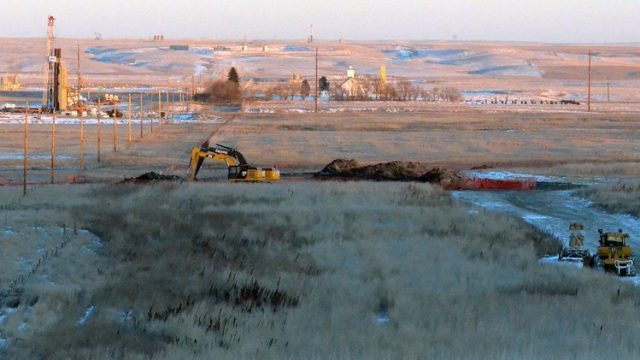If You're Going To Write About Oil Industry Spills, Provide Context

“An analysis of data from leading oil- and gas-producing states found more than 180 million gallons of wastewater spilled from 2009 to 2014 in incidents involving ruptured pipes, overflowing storage tanks and even deliberate dumping,” reports the Associated Press. “There were some 21,651 individual spills. The numbers are incomplete because many releases go unreported.”
North Dakota was among the states providing spill data, and that data shows that spills have (not at all surprisingly) increased alongside domestic oil production:
The data obtained from Texas, North Dakota, California, Alaska, Colorado, New Mexico, Oklahoma, Wyoming, Kansas, Utah and Montana — states that account for more than 90 percent of U.S. onshore oil production. In 2009, there were 2,470 reported spills in the 11 states; by 2014, the total was 4,643. The amount spilled doubled from 21.1 million gallons in 2009 to 43 million in 2013.
That’s good data, and worthy of news coverage. Problem is, the Associated Press isn’t necessarily providing a complete picture.
Here’s another quote from the AP story which puts its finger on the problem: “You’re going to have spills in an industrial society,” Katie Brown, spokeswoman for Energy In Depth, a research arm of the Independent Petroleum Association of America, told the AP. “But there are programs in place to reduce them.”
[mks_pullquote align=”right” width=”300″ size=”24″ bg_color=”#ffffff” txt_color=”#000000″]How many of those incidents had an actual environmental impact? Maybe only a small percentage. Or maybe a very large percentage. The point is that we don’t know…[/mks_pullquote]
Ok, so what is the impact of those programs intended to reduce spills? We don’t know, because the AP didn’t put that in their story.
Also, how many of these spills had a real environmental impact? Because as Brown’s comments indicate, the industry knows well that spills happen, and they prepare for them. For instance, the highest frequency of spills tend to occur at places like well sites or pumping stations, where the industry has prepared the surrounding area for possible spills. Because of that preparation those spills often have zero environmental impact.
So of the 21,651 spill incidents, and over 180 million spilled gallons, the Associated Press is reporting how many occurred in locations where the industry was prepared for it? How many of those incidents had an actual environmental impact?
Maybe only a small percentage. Or maybe a very large percentage. The point is that we don’t know because the Associated Press isn’t telling us, and that means we aren’t getting a complete picture.
I’m not saying spills aren’t a problem. Only that, if we want reasonable solutions to the problem based on a reasonable assessment of it, we need to have an accurate picture of what the problem really is.




